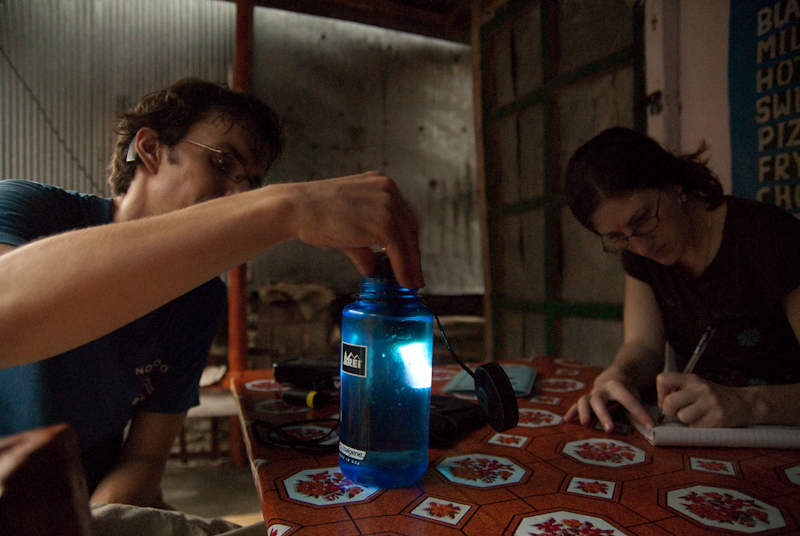
You know how in movies and television shows roosters crow just as the sun is beginning to rise? That's bullshit. Roosters crow all night, and then continue after the sun has risen. They're the most obnoxious animals that I can think of, besides our cat, and everyone in Kathmandu seems to have one (a rooster, not a cat, Nepalis pretty much hate cats).
Normally 4:30 is closer to the time I go to bed than get up, but with shifting our clocks almost exactly twelve hours, our early bed time the night before, and the crowing, waking at 4:30 wasn't a problem. We got dressed, grabbed our bags and dragged them out to the taxis that were taking us to the bus station. Between the six of us and our bags, it was quite a feat packing everything in, but with a little experimentation we made it work. The taxi I rode in had incense burning in the air vent, and Nepali music playing on the radio, both of which served as a welcome distraction as we sped through the early morning streets of Kathmandu.
A funny thing happened at the bus station. Like just about every other place where there are buses, there are people walking around selling things - food, drinks, trinkets, the stuff nobody really needs, and in this case, watches. I was already wearing a watch, but they tried to sell me one anyway. As I was saying no I took a quick glance at the watches. Something caught my eye, so I looked again, and saw that they were trying to sell me a counterfeit copy of the watch that I was wearing. It's nothing special, just a Seiko diver that I use as an every day beater, I was surprised that anyone would even bother to make a fake version. But I digress.
The bus system in Nepal works a little bit different than in the United States. Buses aren't owned or run by the government. If someone wants to be a bus driver they buy a bus and start picking people up. I suppose there are certain advantages to this, but it also means that the buses can be pretty inconsistent. Actually, I should say that the buses are very consistent - consistently bad, and poorly maintained. The drivers are what's really inconsistent. Some are great - they drive at a reasonable rate, are sober, and aren't overly aggressive. Others aren't so much - they speed, they're drunk, they pass aggressively and race each other for fares at the risk of wrecking the bus and everyone inside it. Fun.
Our first driver turned out to be a pretty good one. Without the driver to worry about, we were left to the helper's questionable taste in music and movies, and hoping the drivers around us were sober - for the six hours it took us to travel one hundred miles. Before you start thinking that's a pretty outrageous amount of time to spend going one hundred miles, I should mention that another group we ran into later took over twelve hours to travel the same route * - we were doing pretty well. Aside from the awful movie that was restarted after every food and bathroom break and played at full volume.
Our first bus ride ended in Besisahar which is the traditional start of the trek. In order to avoid walking on roads and to save some time we decided to have lunch and then take a jeep up to the end of the road. The jeep was more like another bus than a jeep, and it was packed about as tight as can be. To avoid spending forty-five minutes with a bunch of hot sweaty people I rode on top with the luggage and a few of the younger Nepali guys. It was like a roller coaster, with everyone throwing their hands in the air and yelling every time we started down a steep section, crossed a stream, or passed a girl. Then I discovered that two of the three bolts intended to attach the ladder I was riding to the bus were missing, and remembered that this was more of a third world death trap of a roller coaster.
At the time, the road ended about two hours of walking away from Nadi Bazaar, though with continued construction the distance is likely less now. The distance worked out to be just about perfect because just as we arrived in Nadi Bazaar, the sporadic drizzle we'd been walking in turned into a full out downpour. After that we were left with what would become the nightly ritual of drinking tea, purifying water, eating dinner, and collapsing into bed sometime around eight.
*something about the bus getting a flat tire and the spare tire being flat and flagging down another bus which also had a flat spare tire and then driving on a flat tire to find a shop to fix it. Twice.
[svgallery name="Nepal2"]
